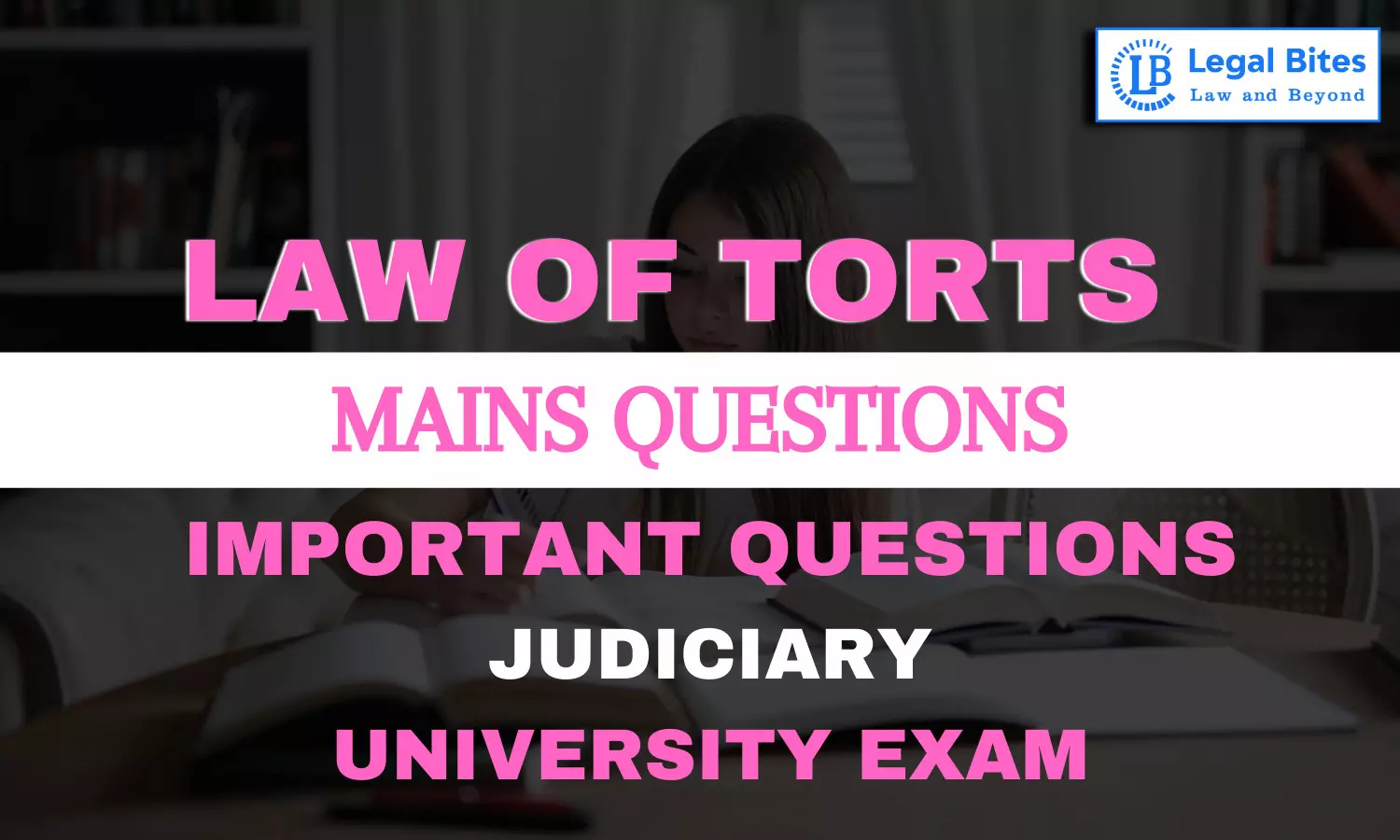Enumerate the rights in the law of Torts, the exercise of which even if they cause damage, are not actionable (damnum sine injuria). Illustrate your answer.
Find the question and answer of Law of Torts only on Legal Bites.

Question: Enumerate the rights in the law of Torts, the exercise of which even if they cause damage, are not actionable (damnum sine injuria). Illustrate your answer. [BJS 1978]Find the question and answer of Law of Torts only on Legal Bites. [Enumerate the rights in the law of Torts, the exercise of which even if they cause damage, are not actionable (damnum sine injuria). Illustrate your answer.]AnswerIn tort law, certain actions that result in damage or loss to another person or property...
Question: Enumerate the rights in the law of Torts, the exercise of which even if they cause damage, are not actionable (damnum sine injuria). Illustrate your answer. [BJS 1978]
Find the question and answer of Law of Torts only on Legal Bites. [Enumerate the rights in the law of Torts, the exercise of which even if they cause damage, are not actionable (damnum sine injuria). Illustrate your answer.]
Answer
In tort law, certain actions that result in damage or loss to another person or property may not be actionable if they fall under the category of "damnum sine injuria." This Latin phrase translates to "damage without injury," which refers to situations where a plaintiff suffers harm or loss, but the defendant has not committed any legal wrong or violation of the plaintiff's rights. The following are some examples of the rights in tort law that may be exercised without incurring liability:
Right to Competition: In business, competition is a natural part of the market. Competition may result in the loss of customers or revenue for a business, but it is generally not actionable as long as the competition is fair and legal. For instance, a business can advertise its product or service as being better than a competitor's product, as long as the claims made are true and not misleading.
Right to Self-defense: Individuals have the right to defend themselves against an imminent threat of harm. If someone attacks another person, that person has the right to use reasonable force to defend themselves. If the force used in self-defense is excessive or goes beyond what is reasonable, then it may be considered a legal wrong.
Right to Freedom of Speech: In many countries, individuals have the right to freedom of speech, which includes the right to express opinions and ideas without fear of legal action. This right is not absolute, and it does not protect speech that is defamatory, discriminatory or incites violence.
Right to Property: Property owners have the right to use and enjoy their property as they see fit, as long as they do not cause harm to others. For example, if a property owner decides to cut down a tree on their property, and the falling tree damages a neighbour's fence, the property owner may not be liable if they took reasonable care to prevent the damage.
Right to Nuisance: A nuisance is any activity or behaviour that interferes with the use and enjoyment of another person's property. However, not all nuisances are actionable. For instance, a person who lives near a busy road may experience noise and pollution from the traffic, which can be considered a nuisance. However, this type of nuisance is not actionable because it is a natural part of living in a populated area.
One notable case where the principle of "damnum sine injuria" was applied in the case of Rylands v. Fletcher, (1868) LR 3 HL 330. In this case, the defendants constructed a reservoir on their land, which caused water to flood into the plaintiff's mine, causing damage. However, the defendants had taken all reasonable precautions and were not negligent in constructing the reservoir. The court held that the defendants were not liable for the damage caused to the plaintiff's mine, as they had not committed any wrongful act or omission.
Another case where the principle of "damnum sine injuria" was applied in the case of Gloucester Grammar School case, (1410) Y.B. 11 hen. IV of 47. In this case, the plaintiff, who was a schoolmaster, sued the defendant for opening a rival school nearby. The court held that the defendant had not committed any wrongful act, as anyone was free to open a school in the same area. Thus, the plaintiff's loss of pupils and income was considered "damnum sine injuria."
In conclusion, the law of torts recognizes that some actions that result in harm or loss to another person or property may not be actionable if they fall under the category of "damnum sine injuria." The above examples illustrate some of the rights in tort law that may be exercised without incurring liability, even if they result in harm or loss to another person.

Mayank Shekhar
Mayank is an alumnus of the prestigious Faculty of Law, Delhi University. Under his leadership, Legal Bites has been researching and developing resources through blogging, educational resources, competitions, and seminars.
